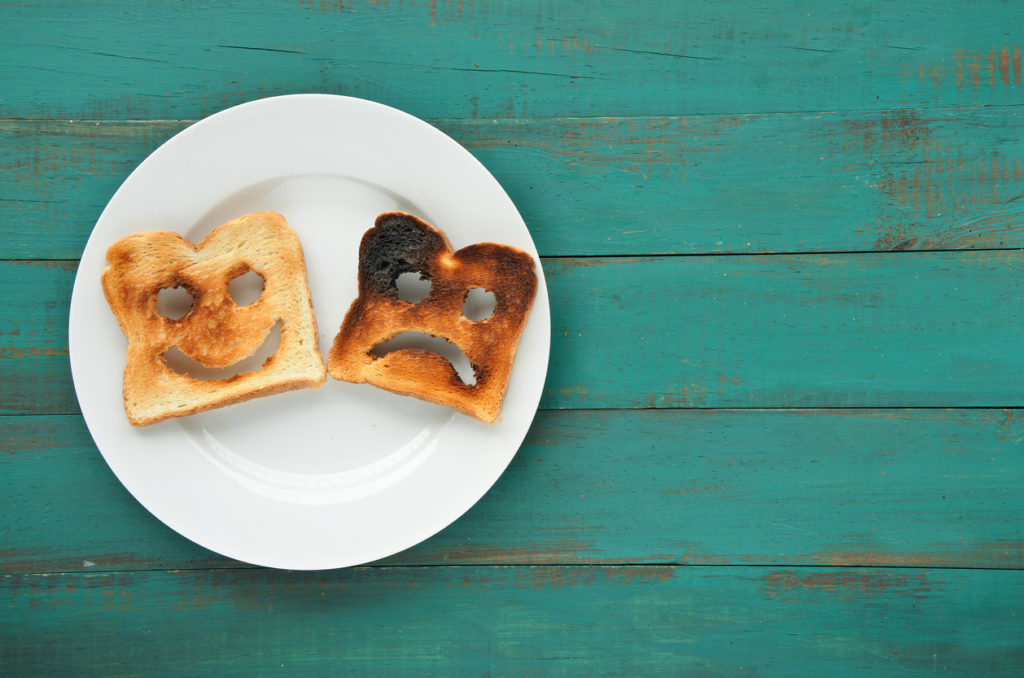 When it comes to weight loss, white carbs are out. White bread is evil, brown rice is best, and if you do spring for pasta, it better be whole-wheat. Quinoa pasta is cool, too.
When it comes to weight loss, white carbs are out. White bread is evil, brown rice is best, and if you do spring for pasta, it better be whole-wheat. Quinoa pasta is cool, too.
The whole-grain trend does make sense. After all, while grains naturally contain three distinct, nutritious parts—the bran, germ, and endosperm—white breads and pastas are stripped of everything but the endosperm, a.k.a. the starchy part, explains registered dietitian Jonathan Valdez, R.D.N., owner of NYC-based Genki Nutrition and a spokesperson for the New York State Academy of Nutrition and Dietetics.
So, with only the endosperm on board, white, refined grains are low in fiber and sky-high in simple sugars, threatening to spike your blood sugar and fat-storing insulin levels. Not exactly a weight-loss superfood.
RELATED: How Many Carbs Should You Eat Per Day to Lose Weight?
Still, white grains and white carbs are also ridiculously fluffy and yummy—meaning that a lot of us have a hard time giving them up. Fortunately, you don’t have to. It’s important to remember that no one food on its own will keep you from hitting your weight-loss goals, explains registered dietitian Alissa Rumsey, R.D., author of The 5-Minute Mindful Eating Exercise.
RELATED: Give Yourself MORE: A Science-Backed, Six-Part Plan for Women to Hit Their Weight-Loss Goals by Defying Diet Culture
“So, if you really enjoy white bread and pasta, don’t cut them out,” she says. Just make sure you take a healthy approach to them.
Eat White Carbs and Still Lose Weight
Here, experts share five tips to help you make your love of white carbs work for your weight-loss goals.
While counting every calorie is enough to drive any woman bonkers, keeping a rough idea of your caloric intake is always important when you’re trying to achieve a caloric deficit, a requisite for weight loss, explains registered dietitian Bonnie Taub-Dix, R.D.N., author of Read It Before You Eat It.
The average slice of white bread contains roughly 75 calories and 15 grams of carbohydrates. Most balanced weight-loss diets recommend getting about 40 percent of your daily calories from carbs. If you’re eating, let’s say, 1,800 calories per day, that works out to about 180 grams of daily carbs.
2. Pair with Protein and Fat
White bread may not be particularly high in calories, but the body absorbs starchy foods relatively quickly, which can result in blood sugar and insulin spikes. The result: fat storage and a cycle of cravings, Valdez says. Your move: Pair your white bread or pasta with some protein, fat, and fiber to slow down your body’s digestion of the carbs and release of sugar into your bloodstream.
Plus, as Georgie Fear, R.D., and I stress in Give Yourself MORE, it’s psychologically easier, and often healthier, to focus on adding healthful foods to our plates than to worry about subtracting less nutrient-dense options.
When making pasta or a sandwich, opt for protein sources such as meat, chicken, eggs, tofu, peas, beans, lentils, and chickpeas. The latter two are also rich in fiber. Great pasta- and sandwich-friendly fat sources include avocado, nuts, cheese, seeds, and olive oil.
RELATED: Why Macros Matter for Weight Loss
3. Try Going Halfsies
Try mixing white pasta with whole-grain pasta. “If you do half a serving of the pasta you love, plus half a serving of the nutritious stuff, you won’t have to compromise flavor to get the nutrients and fiber,” says Taub-Dix. “And, besides, you might even begin to like whole-grain pasta.”
When searching for the right whole-grain mix-in for your pasta dish, make sure that “whole wheat” or “100% whole grains” is the first food on the ingredient list, she says. Also, when cooking, either cook your pastas separately or give your whole-grain pasta a head-start, since they tend to take more time to cook.
4. Know Your Serving Sizes
If you’re more of a “white-carbs or bust” kind of person (meaning going halfsies is way out!), then your best bet is to focus on portion size, suggests Valdez. For example, one standard serving of pasta equals one cup (cooked), and usually amounts to roughly 220 calories and 45 grams of carbohydrates. Most women serve themselves a lot more!
RELATED: Your Guide to Pre- and Post-Workout Carbohydrates
5. Downsize Your Noodles
When you crave the classic comfort food, go for smaller pasta shapes which will make your portions seem bigger, without actually making them bigger, Valdez says. You’ll get more pieces of pasta when you eat macaroni or angel hair pasta than you would with larger pasta shapes like rigatoni or fettuccini. So, the next time you’re in the pasta-aisle, think small.
Claim the positive: Embrace your strength, satisfy your appetite, prioritize joy, get more rest, and fall in love with your body. Be more authentically, unapologetically you. Weight loss is just one (of many) life-changing effects. It starts now.
